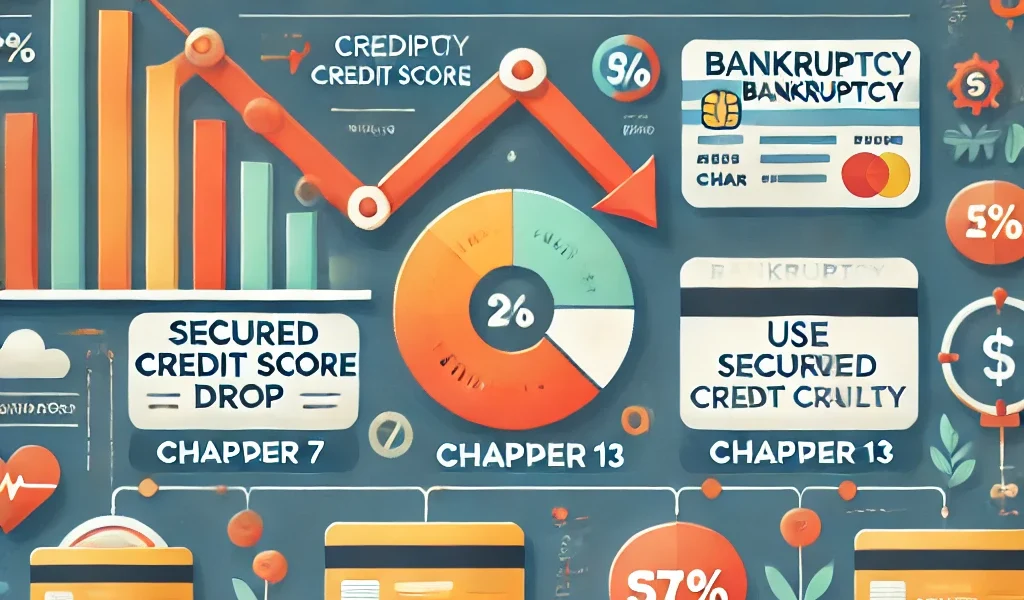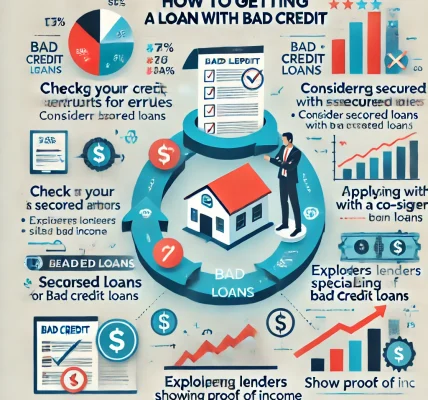Filing for bankruptcy is often seen as a last resort for individuals overwhelmed by debt. While it provides financial relief, it also has long-lasting effects on your credit score. Understanding these impacts and taking the right steps to rebuild your financial standing is crucial. In this guide, we will explore how bankruptcy affects your credit score and provide actionable strategies to recover effectively.
Understanding Bankruptcy and Its Impact on Your Credit Score
Bankruptcy can severely lower your credit score and remain on your credit report for years. The two most common types of bankruptcy for individuals are:
- Chapter 7 Bankruptcy: This type of bankruptcy wipes out most unsecured debts but remains on your credit report for up to 10 years.
- Chapter 13 Bankruptcy: This allows you to restructure and repay your debts over a period of time, usually 3-5 years, and remains on your credit report for 7 years.
The impact of bankruptcy on your credit score depends on several factors, including your credit history before filing. If you had a high credit score, the drop will be more significant compared to someone with already poor credit.
Immediate Effects of Bankruptcy on Your Credit
- Significant Drop in Credit Score: You may see a decline of 150-250 points or more, making it difficult to obtain credit in the short term.
- Limited Access to Credit: Many lenders will consider you a high-risk borrower, limiting your ability to secure new loans or credit cards.
- Higher Interest Rates: If you do qualify for credit, you will likely face higher interest rates due to the perceived risk.
- Difficulty in Renting or Employment: Some landlords and employers check credit reports, and a bankruptcy can be a red flag.
Steps to Rebuild Your Credit After Bankruptcy
Rebuilding credit after bankruptcy requires patience and strategic planning. Follow these steps to gradually restore your financial health:
1. Review Your Credit Report for Accuracy
Obtain a copy of your credit report from all three major bureaus (Equifax, Experian, and TransUnion) and check for errors. Dispute any inaccuracies to ensure your report reflects accurate information.
2. Create a Realistic Budget and Emergency Fund
Develop a strict budget to avoid financial pitfalls in the future. Building an emergency fund will help you cover unexpected expenses without relying on credit.
3. Obtain a Secured Credit Card
A secured credit card requires a cash deposit as collateral. Using it responsibly and making timely payments can help rebuild your credit score over time.
4. Become an Authorized User
Ask a trusted family member with good credit to add you as an authorized user on their credit card. This can help improve your credit profile without taking on additional debt.
5. Apply for a Credit-Builder Loan
Some financial institutions offer credit-builder loans, where you make fixed payments into a savings account. Once the loan term is completed, you receive the funds, and your payment history is reported to credit bureaus.
6. Make On-Time Payments
Payment history is a crucial factor in your credit score. Set up automatic payments to ensure you never miss a due date.
7. Keep Credit Utilization Low
Try to use less than 30% of your available credit limit. A lower credit utilization rate indicates responsible credit management.
8. Diversify Your Credit Mix
Over time, consider adding different types of credit accounts, such as a small personal loan or an auto loan, to improve your credit mix.
9. Avoid Hard Inquiries
Too many hard inquiries (credit applications) in a short period can negatively impact your score. Apply for new credit only when necessary.
10. Stay Patient and Persistent
Rebuilding credit takes time. Avoid falling into old financial habits and stay committed to positive credit behaviors.
Conclusion
While bankruptcy has serious consequences, it is not the end of your financial journey. By following the right steps and being proactive in managing your credit, you can rebuild your credit score and regain financial stability. Start with small, consistent actions, and over time, you will see improvements in your creditworthiness.




